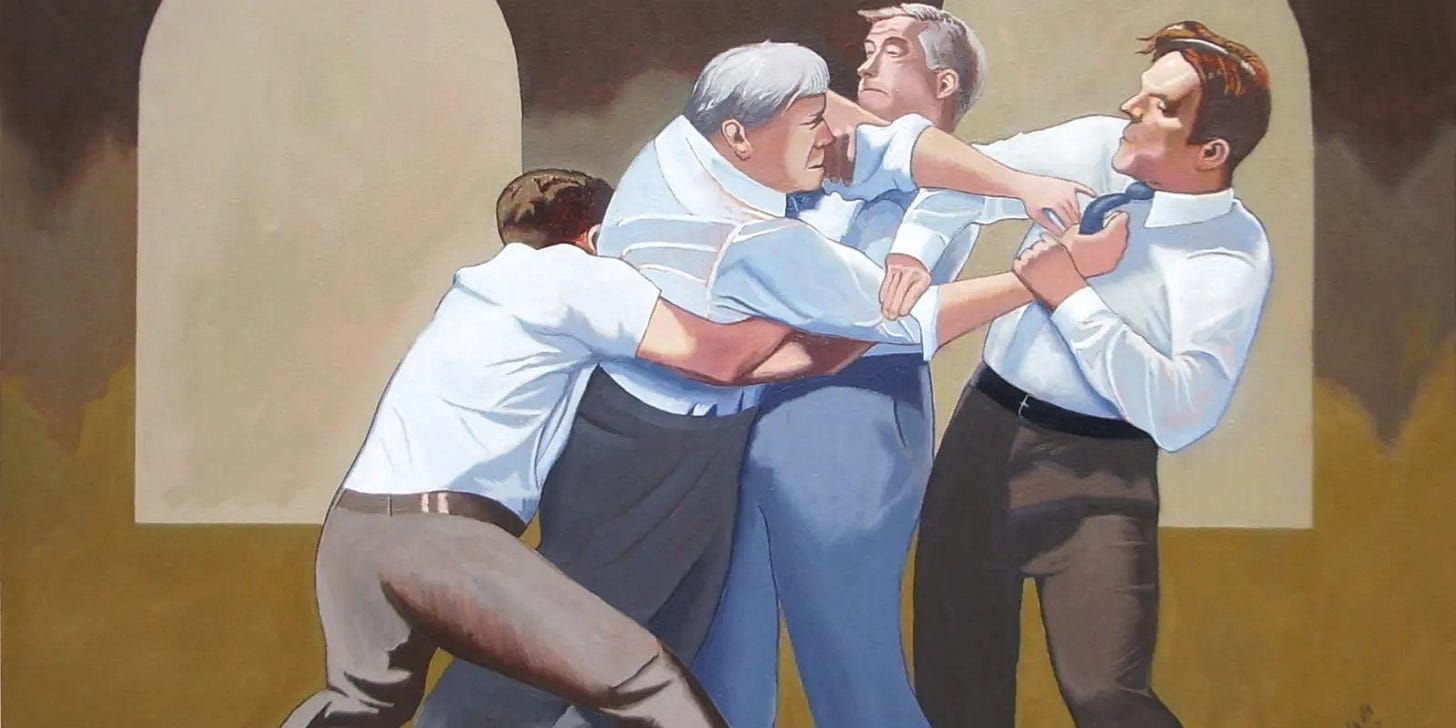Seeking the ‘Public Good’ Will Lead Only to More Division
The U.S. should focus on upholding individual rights instead of subordinating them to any one faction’s concept of the common good
In trying to bring together liberals of various descriptions, from the center-left to the center-right, I’ve noticed something curious and perhaps surprising about American politics. For better or for worse, most Americans are actually in broad agreement. There is a wide consensus in favor of what you might call a liberal, free-market welfare state: a mixture of free speech, private ownership, moderate regulation and “safety net” welfare programs. People disagree on details and implementation, particularly on the scope of regulation and the size of the welfare state. But if you could put that overall mix of policies up for a vote, it would probably get 80% support.
By contrast, there are relatively few people outside that consensus—on the left, a small minority of outright socialists and an even smaller but much angrier number of communists. (Polls that show wide support for “some form of socialism” generally do so by lumping in support for certain welfare state programs—rather than, say, nationalization of industries—which takes advantage of a joint campaign by Bernie Sanders and some conservative commentators to equate “socialism” with the welfare state.)
On the other side, there is a small minority of illiberal nationalist conservatives eager for an “American Caesar.” And sad to say, principled free-marketers like me who dissent from the welfare state are not exactly the vox populi, either. It was a notorious characteristic of the Tea Party movement that they were against Big Government, but don’t you dare touch their Social Security.
On the main substance of what our government does, though, a strong and seemingly durable consensus is reflected in our actual policy decisions. A liberal, free-market welfare state is the system we actually have, and have had for a long time. But if that’s the case, one would think that within this general consensus, disagreements about implementation could be viewed as mere pragmatic differences to be settled by reasoned debate, or at least as issues on which we can make temporary compromises to be revisited later, given that everyone is on the same page.
So why aren’t we living in a new Era of Good Feelings? Why do we fight so bitterly and constantly about politics? Why is there trouble in paradise?
Give Them an Inch and They’ll Take a Mile
To be sure, some of the fighting over politics is entirely artificial. Thus, while Social Security sails on toward insolvency, it has been more than a decade since we have even thought about confronting the inevitable choice between higher taxes and privatization. It is much easier for politicians to spend time fulminating about professors teaching radical ideas on college campuses or about the alleged racial insensitivity of their political opponents—areas that are safely outside the scope of their authority and hence impose no real obligation to do anything. One young congressman gave the game away when he admitted that he hired a staff whose skills are oriented toward “comms”—communication with the media—rather than legislation.
A lot of our politics, particularly when it comes to the culture war, is bitter and angry precisely to distract us from the fact that it doesn’t accomplish anything. To use today’s popular term, it is “performative.” Its function is the mere performance of talking, rather than any result in public policy.
But there are still issues where we have real, fundamental differences. There, the main driver of the acrimony seems to be the fear that the slightest compromise, the slightest move in one direction or another within the broad consensus, is the beginning of a process that will go all the way to the opposite direction—and far outside the consensus.
This is the point at which a centrist would normally exhort us to put aside this phantom fear and work together on reasonable compromises. But what if this fear is not a phantom? For example, many who are generally pro-abortion rights would be willing to concede to some limits on late-term abortions, but they know that this would then be used as a precedent for imposing limits earlier and earlier, until we get policies like the latest Texas law, which imposes a limit so early that it effectively bans abortion.
Similarly, there is the fear that “emergency” stimulus spending in response to the pandemic will usher in a permanent multitrillion-dollar increase in government spending, and that a “temporary” monthly child tax credit payment will inevitably become a permanent program, which will then be treated as a trial run for universal basic income—which takes the welfare state beyond a mere safety net and turns it into a universal entitlement for some to live off the labor of others.
Or if you concede that we should never have named anything after Jefferson Davis or Stonewall Jackson, pretty soon the activist left will be scrubbing history of Lewis and Clark and George Washington.
This outlook poisons even issues on which one would think a reasonable consensus is not only obvious but urgently necessary. Propose any measure to mitigate COVID exposure, and there is now an angry faction on the right that will oppose it with an argument in the form of “give them an inch and they’ll take a mile.”
So the bitter conflict of our politics is not, in fact, an illusion. What seems like it ought to be a stable and placid consensus looks more like a precarious equilibrium between opposing forces that are far outside that consensus.
The Case Against the Public Good
I most frequently hear laments for our lost consensus among the policy wonk types, who wish political debate were like some sort of think-tank discussion, driven by studies and data about which welfare state programs are most pragmatically effective, instead of being derailed by the freighting of these discussions with what they view as false ideological baggage.
There is some truth to this, and we can see the corrupting effect of political coalitions in pushing those who prefer the mainstream consensus to feel that they have to appease the loudest and angriest voices on their party’s fringe. Notice, for example, the way in which a centrist member of Congress like Abigail Spanberger gets so much less media attention and influence than a certain well-known member elected in the same year who spends a lot more time on social media telling the radical fringe what they want to hear.
Yet this very fact indicates that the wider ideological differences are not false or invented. The basic dilemma of the moderates and centrists is that they are moderates and that they are in the center. They don’t stand for a distinct principle of their own but for a watered-down or compromised version of somebody else’s principles.
Oddly, both ends of the political spectrum claim the same underlying principle. If there is one true ideological consensus in today’s politics, it is that the freedom and well-being of the individual should be sacrificed for “the public good.” You will hear it as much from today’s nationalist conservatives, some of whom are trying to rebrand themselves as “common good” conservatives, as from the left.
But rather than being a source of unity, this notion of the public good is an engine of division. We fight so desperately about politics because most people accept that individual rights should be sacrificed for the public good, but they inevitably disagree on what the public good is, who represents “the public,” and who and what should be sacrificed.
For the left, the public good is assumed to require economic redistribution, tearing down private ownership, and a kind of cultural redistribution in which those who are suspected of enjoying “white privilege” are forced to give way to those who can claim that they are “marginalized.” The right, for its part, has embraced limits on capitalism, though mostly for companies that are seen as enemies in the culture war, such as the big social media firms. And conservatives have their own plan for cultural redistribution in which cultural influence is to be clawed back from the urban elite in favor of the advocates of a traditional religious morality.
That’s the problem with the public good. It usually ends up being equated with the preferences of a single cultural and political faction, providing an opening for a populist leader who equates that faction with “the people”—real Americans, the ones who count—as opposed to some real or imagined elite.
Hence, every political debate eventually becomes not an attempt to make a small, technical adjustment within the consensus of a liberal, free-market welfare state, but rather a first step toward either the left’s woke utopia or the right’s nostalgic nationalist dream. It becomes a battle to rescue the common people from a corrupt elite. That’s why every political controversy feels like a high-stakes death match, rather than a conference of policy wonks.
Put Liberalism First
What looks at first like a stable political consensus that can be preserved with mere admonitions to be more reasonable is really an unstable stalemate in a raging conflict. That conflict won’t end until we reestablish the precedence of individual rights over these clashing visions of how government is going to impose one side’s narrow vision of the public good. The current “liberal” consensus descends into conflict precisely because it doesn’t put liberalism first. Instead, it accepts that premise about the public good and gives us the impossible task of coming up with a unified vision about who the public is and how exactly everyone else’s freedom is to be sacrificed for their supposed good.
Perhaps we should be grateful for all the bitter fighting because it keeps the two main factions from uniting around a single illiberal agenda. But this means that our hopes for a liberal system, or at least for the preservation of the status quo consensus, is dependent on constant conflict among people who wish the whole system ill.
It is improbable that we will ever completely eliminate acrimonious arguments about politics. Historically, the Era of Good Feelings was a brief exception. But we can reduce the scope and intensity of these conflicts by challenging the basic assumption shared by both sides: the subordination of individual liberty to the common good. Only rejecting this premise will keep us from casting an envious eye on our neighbors to see how we can subordinate them to our economic or cultural vision, causing them to adopt a permanent attitude of suspicion and hostility in self-defense—with everyone convincing themselves that the other guy started it.
If we embrace the case against the public good, we might actually be able to arrive at a stable consensus, and the relative civic peace to be won by no longer hatching schemes to invade the rights of our neighbors might even be considered a kind of common good.





